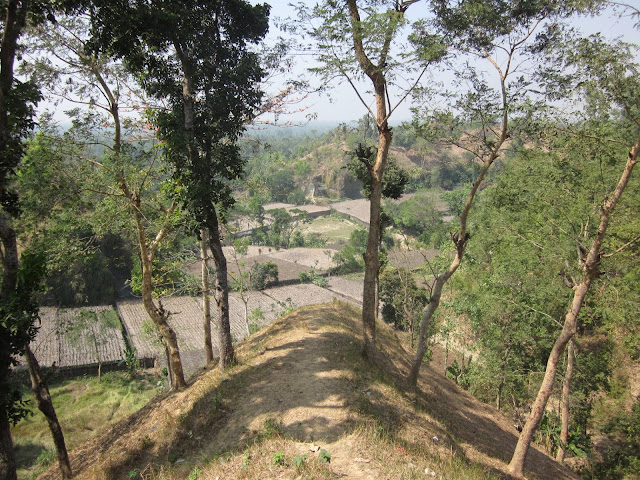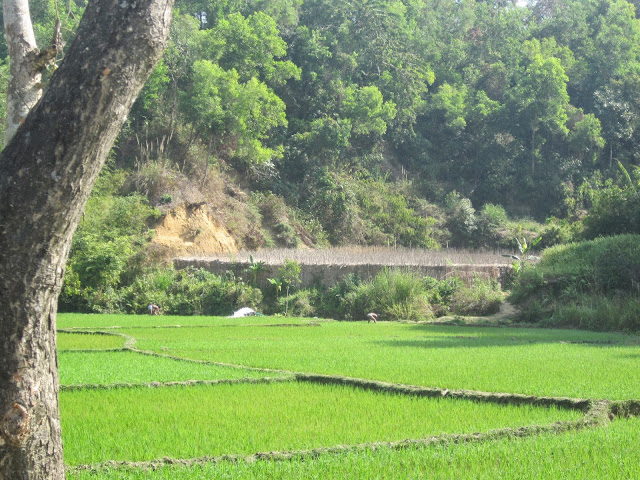“Man's dearest possession is life. It is given to him but
once, and he must live it so as to feel no torturing regrets for wasted years,
never know the burning shame of a mean and petty past; so live that, dying he
might say: all my life, all my strength was given to the finest cause in all
the world—the fight for the Liberation of Mankind.”
 |
| Paddy and paan on the Shaplapur Road. |
Hear the harmonium start to turn its churning
phrase? Is that the dotara that’s plucking out the first beats of rhythm? Don’t
worry: the folk song voice of the late Shefali Ghosh isn’t far off; on the
subject of Moheshkhali’s paan she’s got something to say…
But before we hand over to Shefali’s recording, let’s
meet Jamal Hossein, 25, the betel seller at the front of his family’s tea shop in
Gorakghata. Watch him set to work! Clearly he could go elaborate on us:
cardamom, anise, cloves, shredded coconut, chewing tobacco, a mukhwa digestive mouth-freshening mix and
sugar coated fennel seeds; but as well he keeps it simple.
 |
| Tending paddy below, paan barouj above. |
Watch how with adept fingers he folds the paan khili into its usual conical package
shape; watch how… Hey presto! It’s ready…
 |
| A tea shop in Gorakghata |
But wait… Abu Taher’s beaten us to it. At the first tea shop bench in from the street he’s already chewing. The 40-year-old truck driver from Chittagong carts cement to Moheshkhali, six-hours each way, up and down every day. When work is done, he knows to savour an island paan before climbing back into his rig.
 |
| A map of Moheshkhali Island. |
I’m not sure Taher’s face as it chews is
beautiful in any usual sense though his wife probably likes it. Yet for
Moheshkhali his face is new, even if it’s a new face that re-arrives daily. Jodi shondor akkhan mukh paitam, Jodi notun
akkhan mukh paitam… Shefali’s begun: “If I come across a beautiful face; if
I come across a new face…”
Moheshkailla
paaner khili tare bhanai khaoaitam! “I’ll make for
him a Moheshkhali paan-khili, for him to chew,” sings the queen of Chittagonian
folk music, who started her music career at age seven and was famed for the
dramatic on-stage presentation of her songs.
Yet if for Shefali our island paan means love,
let’s not forget 28-year-old Rokshana Aktar. She’s not with us at the tea shop
right now. She’s at home in Choto Moheshkhali Union, and if not sewing with the
eldest of her three daughters then she might be mixing fertilizer or organising
accounts, her contribution to the family’s paan garden business, the tasks she
can complete without leaving the house.
 |
| Paan / Betel leaf, ready for sale. |
First the stick and straw barouj, the paan’s shade house is constructed, often in tight
valleys or on slopes of Moheshkhali’s otherwise-difficult-to-farm hills. Twenty
days after cuttings are planted fertilizer is applied, cow dung, potassium,
magnesium… Two weeks later stakes are affixed to hold the burgeoning vines.
“Insects are the biggest risk,” Aktar says, “If
they attack the whole plant dies.”
 |
| Betel vines growing in a barouj. |
Ek dinelai rakhi tare, Housher pirit shikhaitam… sings Shefali. “I will keep him for a day. I will teach him sweet love.” And for Shefali’s one day of Moheshkhali paan fostered love, Aktar’s husband and one of her two sons attend to the barouj daily. They only hire outside help at peak times.
 |
| Rokshana Aktar. |
“Poush to Falgun are the most profitable months,”
says Aktar the accountant, referring to the December – March days of winter to
early spring. During this period the supply of betel leaf is less and prices
rise. During the monsoon months the opposite applies. Yet in all twelve months
there is paan to be harvested.
Noya mukher
noya kotha, Sunite shondor…
Mazemaze paan
cibaito, Hashiro bhitor.
“A new face’s new words sound beautiful,
Sometimes he will chew paan while laughing
inside.”
“We used to grow tomatoes, brinjal and chilli on
rented land,” says Aktar, “My husband did carpentry or any odd job.” But for
the last three years it’s paan’s words that have them laughing. “The income is
good,” she says, “To invest 1 lakh taka is to get 2 lakhs in sales.”
 |
| Paddy and paan, leading up a valley. |
Four leaves make one gonta and 80 gontas make
one birra; and one birra sells for between 150 – 300 taka depending on quality:
the sums one needs to know in the betel game. Every Tuesday and Friday the
largest betel market on the island is held at Boro Moheshkhali’s Notun Bazar.
Aktar’s husband goes fortnightly, returning with about 20,000 taka.
 |
| Paan for sale in Notun Bazar, Big Moheshkhali. |
And while he’s at the market he might meet Mohammed Zakaria, 35, just as easily as we’ve met him on the second bench from the street, back in Jamal’s tea shop. He’s chewing paan while Shefali takes rest for a short instrumental break.
 |
| It's a busy scene at Notun Bazar paan market on Tues, Fri. |
But he doesn’t only go to Notun Bazar to sell;
he also speculates. “I feel the weight,” he says of how he chooses betel to buy
that he thinks he can resell minutes later at a higher rate. “One birra can
weigh as much as a kilogram, though it’s usually only 300 to 400 grams.”
Shefali’s accompanying him now… Premer mala dono hate, Tare golai poraitam… “With two hands I
place love’s lei onto his neck.” It’s probably how Zakaria feels when he’s
gambled well and re-sold paan at a healthy profit.
 |
| Negotiations underway at Notun Bazar. |
Meanwhile at the third bench in from the street
is 37-year-old Sultan Mohammed Khan. A more local than this local would be hard
to find. His family has been in Moheshkhali for generations; an ancestor was
chairman of half the island in the eighteenth century, according to Khan, when
Hiram Cox was the running governor.
His grandfather once exported salt by sampan to
Kolkata. His father established shrimp farms while Khan is a landholder who
leases out family land on a fifty-fifty share basis to both salt producers and
shrimp farmers. And Khan enjoys his paan. “Moheshkhali’s paan has heavy taste!”
Rosher kotha,
Rosher pirit, Jodi na jane… Duyan ekhan kotam tare, Premer karoner,
Shefali continues.
 |
| Areca nut / Shupari. The best comes from Teknaf. |
Khan’s lifestyle allows him to travel. He’s been
to all but 17 districts of Bangladesh, he claims, and in 1994 ventured as far
as a Kolkata book fair in search of a tome by one of his favourite authors:
Nikolai Ostrovsky. Yes, he’s a landlord who appreciates a staunchly communist
writer; apparently he can contemplate Ostrovsky’s heavy phrases and chew heavy-tasty
paan at the same time.
 |
| Paan growing at the foot of Adinath Hill in Little Moheshkhali. |
 |
| Paan is one of the main crops on Moheshkhali. |
As for Indian betel he’s still less impressed. “It
looks nice,” he recalls, “and it’s grown with more scientific methods; but the taste
isn’t so good.”
Noronarir
housher pirit, Ki moza tare bujaitam… she sings. “Sweet
human love, how nice it is he will know.”
Let the final spoken words be from Jamal the
betel seller. He’s explaining that not all Moheshkhali paan is the same. “The
paan from older, hillside gardens is the best,” he says, “Paan from newer
gardens is a little less tasty and softer.” And it can’t be certain even
Shefali knew that.
 |
| Paan, sold by the birra. |
It really does taste sweeter. I tried one before I'd even heard of Moheshkhali paan and I thought "Wow! That was a tasty paan."
 |
| Moheshkhali paan. Immortalised in folk song. |
So whether it’s for livelihood or speculation,
as a truck stop treat or while considering the wisdom of a Soviet writer,
whether its hillside or new garden variety, while chewing Moheshkhali’s paan
and imbibing its distinctively sweet, easy recognisable flavour, you might just
find thrown into the bargain a hint of Shefali’s immortal tones, of love’s
serenade.
 |
| A paan barouj in Moheshkhali will often be located in a valley or on a hillside. |
An abridged version is published in The Daily Star, here: Lovers of Moheshkhali Betel
An aside: after visiting the paan market one hot morning in Big Moheshkhali, it was time for breakfast. I found a local hotel and before long two local paan traders joined me at the table. Of course we got to talking and they said they'd just sold - their pockets were full of cash. Partly from feeling flush and partly from general hospitality, when I finished (before them) they insisted on paying for my breakfast too. Knowing there was no way to get around that I agreed and walked to the front counter where, talking to the manager, I secretly paid theirs instead! The manager was so impressed he gave a discount. Meanwhile those two just understood what I'd done as I left... too late to stop me!


No comments:
Post a Comment